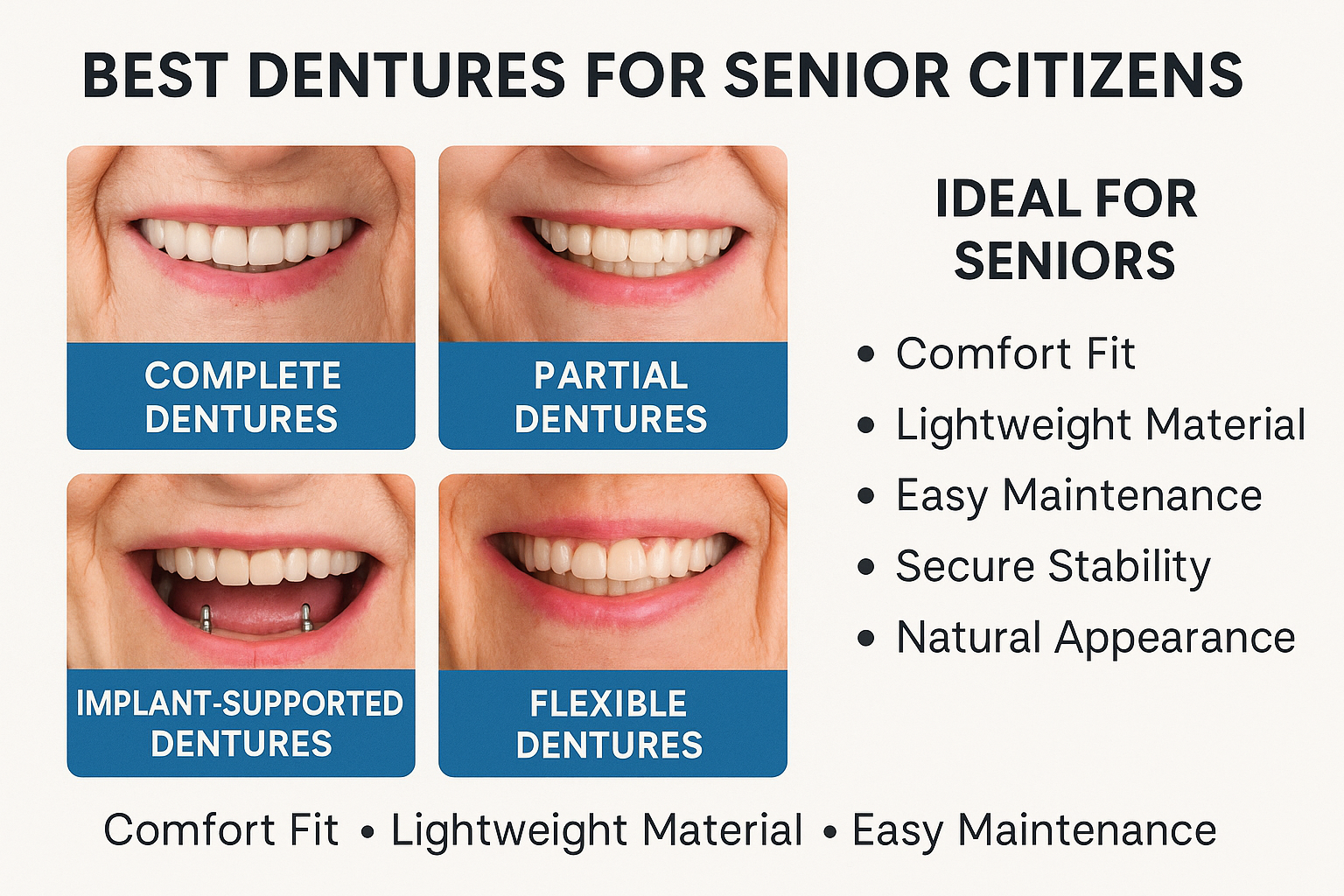
Best Dentures for Senior Citizens
Senior citizens face unique challenges when it comes to oral health. Dentures play a pivotal role in restoring chewing ability, facial aesthetics, speech clarity, and overall confidence. But not all dentures are created equal. As people age, tooth loss becomes increasingly common due to gum disease, decay, or general wear and tear. For senior citizens, finding the right denture solution is not just about aesthetics—it’s about comfort, functionality, and overall health. Let’s explore which denture types work best for older adults, especially in terms of comfort, cost-effectiveness, and long-term satisfaction. This article explores the best dentures for elderly individuals, covering types, materials, benefits, maintenance tips, and how to choose what suits your lifestyle.
Types of Dentures Suitable for Seniors
- Complete (Full) Dentures
- For individuals who have lost all their teeth in one or both arches.
- Can be conventional (after gums heal post-extraction) or immediate (placed right after extraction).
- Materials: Acrylic resin is most common due to its lightweight and affordability.
- Partial Dentures
- Ideal for seniors with some natural teeth remaining.
- A removable option with metal or acrylic base and artificial teeth.
- Clasp onto natural teeth for support.
- Implant-Supported Dentures
- Fixed or removable dentures attached to titanium implants embedded in the jawbone.
- Best for: Seniors with good bone density or those who can afford a long-term solution.
- Superior in stability, chewing ability, and speech clarity.
- Flexible Dentures (Valplast or Nylon-based)
- Lightweight, bendable material without metal clasps.
- Excellent comfort and esthetics.
- Best for: Seniors with sensitive gums or metal allergies.
- Overdentures
- Fit over remaining roots or dental implants.
- Improve bone retention and reduce ridge resorption.
- Commonly used in lower jaw where retention is usually a problem.
What Makes Dentures Ideal for Senior Citizens?
| Feature | Importance for Seniors |
| Comfort Fit | Prevents soreness, ulcers, and gum irritation. |
| Lightweight Material | Easier to wear for longer durations. |
| Easy Maintenance | Reduces chances of fungal infections or bad breath. |
| Secure Stability | Prevents slipping during talking or eating. |
| Natural Appearance | Boosts confidence and social interaction. |
Best Denture Materials for Elderly Patients
✅ Acrylic Resin
- Commonly used in full dentures.
- Affordable, lightweight, and easy to adjust.
- May wear down faster than other materials.
✅ Cobalt-Chrome Metal Framework
- Used in partial dentures.
- Offers superior strength and longevity.
- Heavier and more visible, but highly durable.
✅ Flexible Nylon Resin
- A great option for sensitive gums.
- No metal, hence more esthetic.
- May be harder to adjust or repair.
✅ Porcelain Teeth
- Durable and esthetically natural-looking.
- Heavier, can wear down natural opposing teeth.
- Mostly used in complete upper dentures.
Factors to Consider Before Choosing Dentures
- Oral Health Status
- Bone density, remaining teeth, and gum condition play a role.
- Budget
- Acrylic dentures are cheaper; implant-supported ones are costly but long-lasting.
- Lifestyle & Diet
- If one enjoys chewy food, opt for more stable options like implant-supported dentures.
- Manual Dexterity
- For those with arthritis or Parkinson’s, easy-to-insert and remove options are essential.
- Aesthetic Expectations
- Seniors who want a natural look should consider high-quality materials.
Maintenance Tips for Senior Denture Users
- Soak dentures in denture cleanser overnight.
- Clean daily with soft brush and mild soap—not regular toothpaste.
- Visit the dentist biannually for adjustment and oral exams.
- Avoid hot water which can warp the denture material.
- Use adhesives if needed, but consult your dentist first.
Benefits of Well-Fitted Dentures for Seniors
- Improves chewing and digestion.
- Prevents jawbone resorption (especially with implant options).
- Enhances speech clarity.
- Prevents facial sagging and premature aging.
- Boosts social confidence and quality of life.
Conclusion
Choosing the best dentures for senior citizens is a highly personalized decision. What works for one individual might not suit another. A thorough dental evaluation and understanding of lifestyle needs are essential for selecting the right type. Whether you choose flexible dentures for comfort or implant-supported ones for durability, the goal is the same—restoring function, health, and confidence in one’s golden years.
✅ To purchase denture care products, click here
Related Reads
Bridge vs Implant vs Denture: Which Tooth Replacement Option is Best?
How to Clean Dentures Naturally: Complete Guide to Safe & Effective Methods
Immediate vs Conventional Dentures: Which Is Right for You?
Can You Sleep with Dentures? Risks, Recommendations & Best Practices
Cost of Full Mouth Dentures in USA, India, and UK: City-wise Comparison & Detailed Guide
10 FAQs (Not Covered in Article)
- Can seniors sleep with dentures in?
It’s generally advised to remove dentures at night to give gums rest and prevent infections. - Are implant-supported dentures painful to get?
The procedure may involve mild discomfort initially but is usually well-tolerated under local anesthesia. - How often should dentures be replaced?
Every 5–7 years, or sooner if they become loose or uncomfortable. - Are there denture options for seniors with diabetes?
Yes, flexible and implant-supported options can be considered with careful monitoring. - Can senior citizens get insurance coverage for dentures?
Some plans do cover basic denture options; advanced types may need out-of-pocket payment. - What if my dentures hurt while eating?
They may need adjustment—visit your dentist immediately. - How can seniors prevent denture sores?
Proper hygiene, good fit, and occasional relining help prevent pressure spots. - Are there eco-friendly denture options for seniors?
Some newer resins are more sustainable, but consult your dentist. - Is it okay to use denture adhesives daily?
Yes, if needed—but use minimal amounts and consult your dentist regularly. - Can seniors use whitening agents on dentures?
No, regular whitening products may damage denture materials. Use denture-safe cleansers only.
